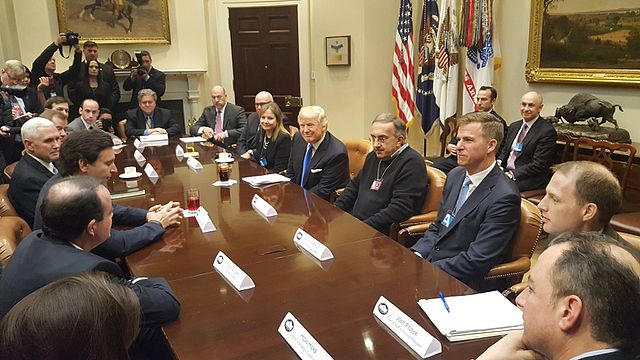
Trump to ‘kick-start’ NAFTA negotiations as early as May, still cagey on the details
by Alexander Panetta, The Canadian Press

The two-decade-old trade deal governs billions in daily cross-border trade, but the U.S. president has provided few specifics on how he plans to overhaul the agreement

Trump met with auto industry leaders shortly after his inauguration. U.S. and foreign automakers building plants in Mexico and selling cars into the U.S. market was a consistent target for Trump throughout the 2016 campaign
WASHINGTON—North America could be immersed in major trade negotiations as early as this spring, with U.S. President Donald Trump signalling a desire to get going quickly on updating the landmark NAFTA agreement.
The president noted Feb. 2 that American law requires him to provide 90 days’ notice to Congress before starting any trade negotiation, while the administration gathers advice from lawmakers and private industry on what bargaining positions to adopt.
”(We) will be very soon, as soon as we get the go-ahead,” Trump said.
”We want to get that whole thing kick-started and going.”
That means trade talks could start as early as May, depending on when Trump fires the starter’s pistol. Mexico’s government predicted this week negotiations would begin in May, as it announced its own 90-day consultation process.
One looming question is what form a final agreement might take—and whether the fundamental document now binding the three North American countries might get a minor update, a major one, or splinter entirely into one-on-one deals between countries.
Trump sounded open to either of those approaches.
He suggested the agreement could get a facelift—or an entirely new body: “I don’t care if it’s a renovation of NAFTA or a brand new NAFTA,” Trump said. “But we do have to make it fair.”
He added, in jest: “Maybe we do a new NAFTA and we add an extra ‘F’ … for ‘free and fair’ trade.”
Related: U.S. federal document offers clues to what Canadian industries may be in Trump’s crosshairs if and when NAFTA is reopened
Some trade experts predict the trilateral agreement of 1993 could wind up breaking into separate bilateral deals between the countries, an idea publicly floated last week by one of Trump’s closest allies in Congress, lawmaker Chris Collins.
The Canadian government sounds willing to go either route. Canadian officials have signalled publicly, and privately, that while they prefer the three-country format as it is, they could live with multiple agreements as a Plan B.
That’s exactly what one leading authority on NAFTA predicts will happen.
The current political trendlines point toward separate bilateral agreements, said Gary Hufbauer, the former U.S. trade official and NAFTA expert who’s now an analyst with Washington’s Peterson Institute for International Economics.
Not that he agrees with it. Hufbauer said bilateral deals would be more complicated, more time-consuming, would suck up additional energy from lawmakers, negotiators, and industry lobbyists, and cause concern about disruptions in supply chains.
But he said the political moment points to a multi-deal approach.
Trump’s team has frequently declared its preference for bilateral deals, over multilateralism. Also, bashing NAFTA is popular in both U.S. parties. So it stands to reason, Hufbauer said, that Trump might try replacing NAFTA.
”I’m just tracing the logic of their various statements,” Hufbauer said.
“It sounds like the logical outcome for NAFTA is to get rid of the name, and have a bilateral agreement with Canada and another bilateral agreement with Mexico…. With Canada it’s easier because you could build on the foundation of the Canada-U.S. Free Trade Agreement. With Mexico you’d kind of be starting from scratch….
”It’ll be quite something.“
Trump also shed some light on his negotiating team. He said his choice for commerce secretary, billionaire businessman Wilbur Ross, will be involved, even though trade talks are usually led by the United States Trade Representative.
The president made the announcement with Ross sitting next to him. He said Ross will be representing the U.S., along with others. That news might relieve some people in Ottawa. Ross is not considered among the most hawkish anti-trade members among Trump’s team.
”He’s fair,” Trump said of Ross. ”And he’s fair to other countries. He will be fair to other countries. I think we’re going to have a whole new picture by the time we’re finished.”
Nonetheless, Ross—a billionaire best known for investing in struggling U.S. manufacturing businesses, stripping them down, and saving them from shuttering or offshoring—has said he won’t go easy on trading partners.
”I don’t intend to be pushed around by anyone,” Ross told his Senate confirmation hearing.
Canada has signalled some of its priorities for a new NAFTA: a permanent agreement on softwood lumber that would end the recurring cycle of once-a-decade trade wars, some expansion of protections from Buy American procurement restrictions, and greater rights for labour mobility.
It might not be easy.
One lawmaker asked Ross at his hearing whether he could eliminate Buy American exemptions in NAFTA entirely, let alone expand them. Ross did not commit an answer. The U.S. government has said almost nothing about its intended priorities.
A former Canadian economic official at the Washington embassy called Ross a solid choice. He said he’s known as a strong negotiator, but one who can also work well with others to find common ground.
”Tough, but fair,” is how Eric Miller, the former official, who now advises clients for the Rideau Potomac Strategy Group, described Ross.
”Ross is both respected universally across the private sector—and trusted by the president… (He) fundamentally is a dealmaker. Which means he will get the importance of pragmatism.”